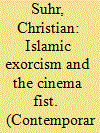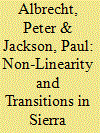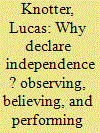|
|
|
Sort Order |
|
|
|
Items / Page
|
|
|
|
|
|
|
| Srl | Item |
| 1 |
ID:
164026


|
|
|
|
|
| Summary/Abstract |
In this article I apply film theory as an analytic prism through which to examine the ritual mechanisms of a particular kind of Islamic exorcism (al-ruqya al-sharʿiyya). I show how these exorcisms operate as a ritual montage that conjures the absent presence of al-ghayb—a hidden world of power that only God can see in its totality and to which the possessed patients and the jinn spirits must succumb. These exorcisms thus provide healing, not in the sense of immediate “well-being” or “relief from pain” but in the sense of moral witnessing, an opportunity to testify to the limits of human seeing and action and to the ways in which invisible and divine forces give shape to the tangible world.
|
|
|
|
|
|
|
|
|
|
|
|
|
|
|
|
| 2 |
ID:
181422


|
|
|
|
|
| Summary/Abstract |
This article explores how transitions produce non-linearity in Sierra Leone’s security and justice programming, as it unfolded from the late 1990s and onwards starting in open conflict. Transitions have received limited detailed analytical consideration in the literature on interventions because they are mundane and inevitable, and therefore taken for granted. However, they definitively condition how programmes evolve. We show that transitions can be seemingly small as well as comprehensive, but commonly have unpredictable, hidden and often unmanageable transformative effects on the trajectory of security and justice programmes. To conceptualize the logic of transitioning, ritual theory – and specifically liminality that is a central component of rites of passage – is used to capture the inherent diffuseness and unpredictability of transitioning. Transitions in programming are liminal moments, ‘neither here nor there’, and as such characterized by ambiguity and indeterminacy. The ambiguity, and importance, of transitions stems from their potency to disturb the direction of programming, requiring the suspension of routine, which internationally funded programming is notoriously ill-suited to deal with. Empirically, the article looks at three types of transitions in Sierra Leone: (1) war to peace; (2) turnover of staff; and (3) elections leading to change of the party in power.
|
|
|
|
|
|
|
|
|
|
|
|
|
|
|
|
| 3 |
ID:
178877


|
|
|
|
|
| Summary/Abstract |
Declarations of independence continue to be commonplace in international affairs, yet their efficacy as means towards statehood remains disputed in traditional international legal and political thinking and conduct. Consequently, recent scholarship on state recognition and emerging statehood suggests that the international persistence of such declarations should be understood in the context of broader international processes, narratives, and assemblages of state creation. Such suggestions, however, risk reifying declarations’ effectiveness more in relation to international structure(s) than to independence movement's own agency. This article, therefore, calls for a reframing of declarations of independence as a ritual in international relations. It argues that participating in the international ritual of independence declaration forms an attempt to ‘fuse’ the movement's political practice with international recognition, serves to express an internal belief in ‘redemption’ through the ‘ascension’ into the ‘celestial’ existence of recognised statehood, and offers an opportunity to internally bolster political community through political performance. Ritual theory, thus, uncovers how the global persistence of independence declarations cannot be explained merely through discrete oppositions of non-recognition versus recognition, belief versus reality, and/or non-state versus state community, and instead opens up new space for understanding the contradictions characterising the international political (in)significance and persistence of statehood declarations.
|
|
|
|
|
|
|
|
|
|
|
|
|
|
|
|
|
|
|
|
|